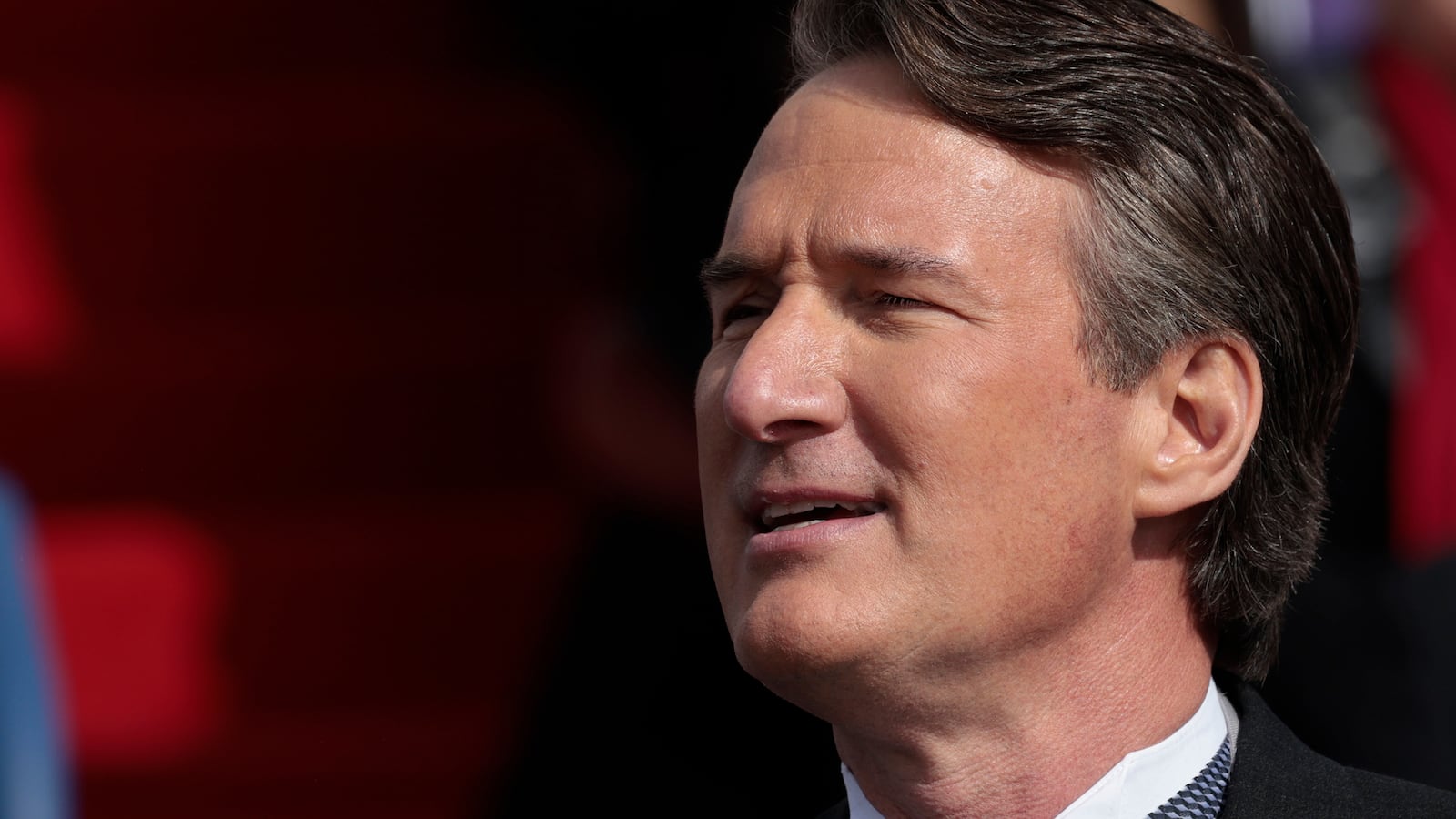Virginia Gov. Glenn Youngkin is less than a year into his governorship, but he’s already making moves to be the GOP’s next presidential nominee.
His political style tries to have it both ways. He aims to be sufficiently middle-of-the-road in a crucial purple state, while also playing the culture-war hits to win over the MAGA base.
But it simply might not be possible to be the “Goldilocks candidate”—serving porridge that’s neither too hot nor too cold—in the 2024 Republican primary.
Campaigning with election deniers and cracking down on transgender kids have gotten the headlines, but the term-limited governor, who campaigned in a “Daddy Knows Best” reassuring red vest is (in plain sight) taking steps that will hurt voters in Virginia’s poorest counties where climate change is wreaking havoc with flooding.
He is moving to withdraw Virginia from the Regional Greenhouse Gas Initiative (RGGI), a cooperative market-based effort among northeastern states to cap carbon emissions. Virginia is the only reddish state in the group, and Youngkin claims the RGGI is a “bad deal” and “isn’t necessary,” even as conservative counties who voted for him in southwest Virginia have requested $2.6 million for flood relief from the cooperative.
Youngkin complains about the cost to consumers (which is minimal, estimated at $2.39 a month and offset by energy efficiency projects), and he has openly doubted man-made climate change—a crowd-pleaser among the GOP base. “I don’t know what’s responsible for climate change, in all candor,” Youngkin said when asked during last year’s campaign whether the actions of mankind are responsible, “I’m a pretty smart guy, but I’m not that smart.”
His response on climate is emblematic of how he dodges issues that are problematic for him politically.
Youngkin was elected governor in Virginia on the basis of being “Trump-adjacent,” says Stephen Farnsworth, a political science professor at the University of Mary Washington, “sympathetic to the concerns of Trump voters without being the kind of dyed-in-the-wool culture warrior who would have crashed and burned in a Virginia election.”

Building a national Republican following requires a different mix, one tilted more towards Trump-centric issues and Trump-sycophantic candidates. This helps explain why Youngkin has rolled back protections for transgender youth and will be campaigning for Kari Lake, an election denier running for governor of Arizona.
“We’re talking about a very precise calibration here,” Farnsworth told The Daily Beast. “Youngkin is making common cause with fellow Republicans against partisan enemies, including environmentalists, LGBT supporters, and supporters of woke education.”
The wealthy investor, a newcomer to politics, made parental concerns about critical race theory and gender identity a winning electoral strategy in Virginia, helping to set the agenda for the midterms. Rumors about his potential on the national scene began before he even took office in January, and Youngkin, limited by Virginia law to a single term, isn’t wasting any time burnishing his MAGA-lite credentials.
This week, he is hosting Republican donors at a two-day “Red Vest Retreat” at a luxury resort outside Charlottesville featuring panel discussions on education and a keynote address by former House Speaker Newt Gingrich. Those attending are there to see if Youngkin has what it takes.
“Whatever comes next for Youngkin in elective or appointive politics depends on his ability to connect with the Trump base and elbow himself to national visibility on Fox and elsewhere,” says Farnsworth.
Youngkin’s move to the right on climate has gotten less attention but is equally alarming.
Here’s how RGGI works: Energy producers buy permits to emit carbon, and the amount of carbon overall is capped. The program delivered more than $220 million in revenues to Virginia in 2021, its first year joining the 11-state compact.
What is there not to like? RGGI was approved in a bipartisan vote in 2020 under Youngkin’s Democratic predecessor, and the program has delivered a 13 percent reduction in carbon emissions in its first year plus money for flood relief and energy efficiency. That didn’t deter Youngkin, who issued an executive order on his first day in office to withdraw from the program. Pushback from local officials and environmentalists then forced him to take the regulatory route, publishing his administration’s intent to take Virginia out of RGGI by the end of 2023. The comment period for the public to weigh in on the regulation to withdraw opened on Monday and goes through October 26.
“Removing Virginia from this program would sacrifice climate and health benefits and forego substantial funding to address flooding and energy efficiency,” says Mandy Warner with the Environmental Defense Fund in Virginia, who vows, “It’s going to be a battle.”
It’s an open question whether Youngkin has the regulatory authority to override a legislative initiative, but for an aspiring MAGA-lite politician, the effort matters more than the outcome.

Youngkin’s new guidelines for transgender students also opened for comment on Monday, as thousands of students across the state walked out of school to protest the draconian rules. Nearly 18,000 comments were recorded online in a little over 24 hours, reflecting the emotional intensity around the requirement that transgender students use the school bathroom aligned with the gender on their birth certificate, and that parental consent is needed to authorize any change in name, pronoun, or bathroom use.
A poll just released by the Center for Leadership and Media Studies at Mary Washington University found that 41 percent of respondents said the governor should have less power over public schools. Twenty-five percent said he should have the same level of power he has now, and just 17 percent favored more gubernatorial power in education.
These numbers indicate it would be wise for Youngkin to “tap the brakes” on some of his more controversial plans to re-shape public education in Virginia, says Farnsworth.
Youngkin’s approval rating is 45 percent with 30 percent disapproving, a respectable but far from stellar number for a newly elected governor in his first year.
“It’s not impressive at all,” says Larry Sabato, a political scientist at the University of Virginia. “Most new governors in any state by this point are in the 60s or upper 50s.” In Sabato’s view, Youngkin is underperforming because he is well to the right of the Republican mainstream in Virginia.
And yet nationally he can’t compete with Florida Gov. Ron DeSantis and Texas Gov. Greg Abbott. “They’ve filled in all the MAGA boxes with a black marker, while Youngkin’s is in pencil,” says Sabato.
Youngkin wants to be the “Goldilocks” candidate. But if he can’t compete with DeSantis and Abbott, then he’s not “just the right temperature.” And if he’s too right-wing for respectable approval ratings in Virginia, he’s not “just right” there, either.
That sums up the Youngkin formula—not too hot to turn people off, not too soft to be accused of shrinking from MAGA, but just right for what he thinks the money people and the voters are looking for.
But it’s not evident that there’s a market for what Youngkin is selling.








